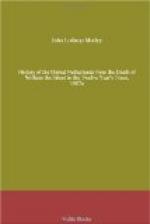It was too gigantic a project to be carried into execution at once, but it was slowly matured by the aid of other ecclesiastics. At last there were indications, both human and divine, that the expulsion of these miscreants could no longer be deferred. It was rumoured and believed that a general conspiracy existed among the Moors to rise upon the Government, to institute a general massacre, and, with the assistance of their allies and relatives on the Barbary coast, to re-establish the empire of the infidels.
A convoy of eighty ass-loads of oil on the way to Madrid had halted at a wayside inn. A few flasks were stolen, and those who consumed it were made sick. Some of the thieves even died, or were said to have died, in consequence. Instantly the rumour flew from mouth to mouth, from town to town, that the royal family, the court, the whole capital, all Spain, were to be poisoned with that oil. If such were the scheme it was certainly a less ingenious one than the famous plot by which the Spanish Government was suspected but a few years before to have so nearly succeeded in blowing the king, peers, and commons of England into the air.
The proof of Moorish guilt was deemed all-sufficient, especially as it was supported by supernatural evidence of the most portentous and convincing kind. For several days together a dark cloud, tinged with blood-red, had been seen to hang over Valencia.
In the neighbourhood of Daroca, a din of, drums and trumpets and the clang of arms had been heard in the sky, just as a procession went out of a monastery.
At Valencia the image of the Virgin had shed tears. In another place her statue had been discovered in a state of profuse perspiration.
What more conclusive indications could be required as to the guilt of the Moors? What other means devised for saving crown, church, and kingdom from destruction but to expel the whole mass of unbelievers from the soil which they had too long profaned?
Archbishop Ribera was fully sustained by the Archbishop of Toledo, and the whole ecclesiastical body received energetic support from Government.
Ribera had solemnly announced that the Moors were so greedy of money, so determined to keep it, and so occupied with pursuits most apt for acquiring it, that they had come to be the sponge of Spanish wealth. The best proof of this, continued the reverend sage, was that, inhabiting in general poor little villages and sterile tracts of country, paying to the lords of the manor one third of the crops, and being overladen with special taxes imposed only upon them, they nevertheless became rich, while the Christians, cultivating the most fertile land, were in abject poverty.




